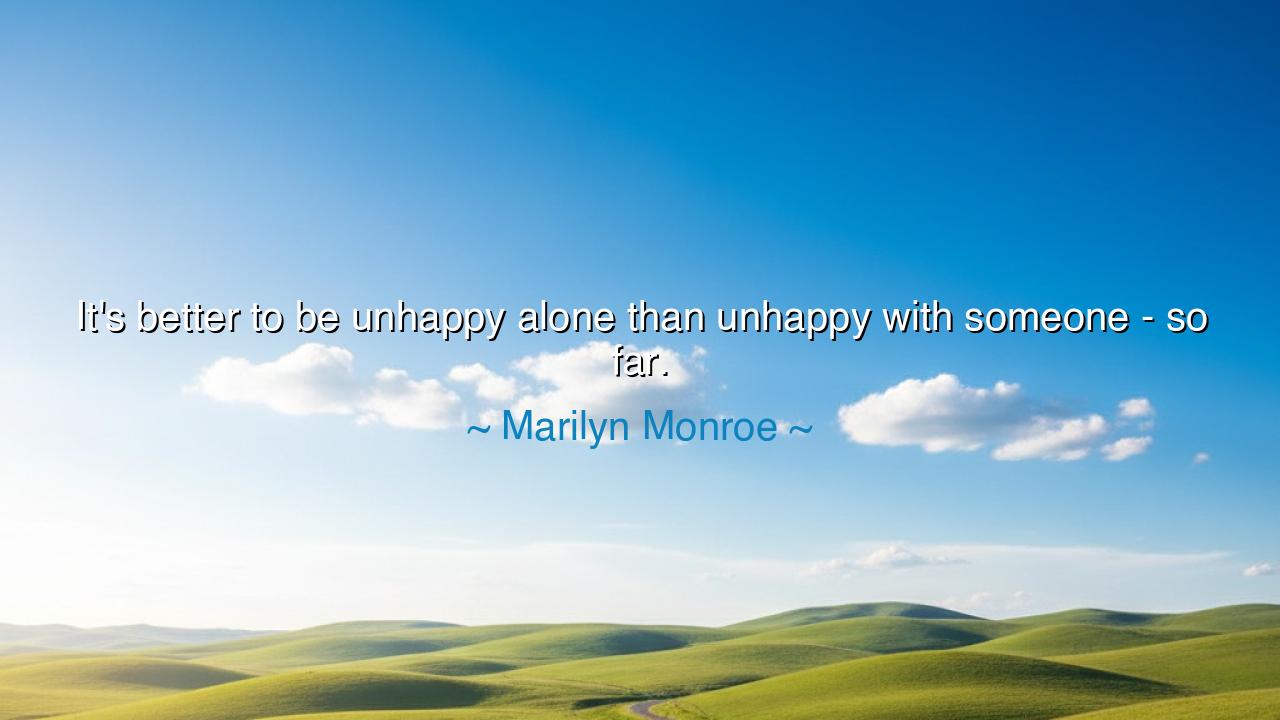
It's better to be unhappy alone than unhappy with someone - so






Marilyn Monroe speaks to the heart of human loneliness and the struggle between seeking companionship and preserving personal peace when she says, "It's better to be unhappy alone than unhappy with someone - so far." In these words, Monroe touches on the power of solitude and the dangers of remaining in relationships that drain us, whether emotionally or spiritually. In a world where connection is often seen as the ultimate goal, Monroe’s insight reminds us that sometimes, being alone—despite its discomfort—can be a more honorable and fulfilling choice than continuing in a partnership that fails to bring us true happiness.
The wisdom behind this idea echoes throughout the teachings of the ancient philosophers. Socrates himself often spoke of the need to know oneself before seeking the company of others, for how can one bring peace to another if they are not at peace within themselves? To enter a relationship in the hopes of finding happiness without first cultivating it within oneself is to invite discontent. The Stoics, with their emphasis on personal virtue and self-reliance, argued that the key to happiness is not external, but internal. They understood that a person must first learn to stand firm on their own, understanding that solitude is not synonymous with suffering, but an opportunity for growth and self-understanding.
This truth is borne out in the lives of many historical figures. Virginia Woolf, the brilliant English writer, spent much of her life grappling with inner turmoil and periods of isolation. While she was often surrounded by friends and admirers, her personal relationships were marked by tension and her own struggle with mental health. Despite the intense love and affection she received from others, it was her time spent alone, in solitude and reflection, that allowed her to create some of her most profound works, including Mrs. Dalloway and To the Lighthouse. Woolf’s life serves as a testament to the idea that sometimes, solitude, even if accompanied by unhappiness, can lead to the clarity and freedom necessary for personal and creative growth. In her case, she chose solitude as a means of preserving her mental peace, even though it came with a measure of loneliness.
Consider also the story of Helen Keller, who, despite being isolated by her disability, chose to create a life filled with purpose and meaning. Her solitude, early in life, was profound, and she was often cut off from the world around her. Yet, rather than resigning herself to loneliness or despair, Keller chose to make the most of her isolation, dedicating herself to learning, to teaching, and to breaking down the walls that confined her. Solitude, for Keller, was not a curse, but a blessing, for it allowed her to forge a path toward independence and to cultivate a deep inner strength that would later inspire the world. In her case, solitude became the birthplace of her power and impact.
Monroe’s words also carry a certain wisdom for those who remain in relationships for fear of being alone. It is easy to be swept up in the desire for connection and the fear of isolation, but as Monroe suggests, there are far worse things than solitude: unhappiness in the company of another. When we remain in relationships that fail to nourish our souls, we may find ourselves feeling more alone than we ever would have in solitude. The misalignment of values, the lack of true emotional connection, or the drain of a toxic relationship can leave us with a sense of emptiness that no other person can fill.
The lesson here is profound and urgent: solitude is not the enemy of happiness—in many ways, it can be its ally. Choosing to be alone rather than remain in an unhealthy relationship is an act of self-preservation and self-love. It is a recognition that our own peace is more important than the façade of a relationship that does not serve us. By embracing solitude when necessary, we allow ourselves the opportunity to heal, to reflect, and to grow in ways that we cannot in the company of those who do not truly support or uplift us.
So, I urge you, dear reader, to consider Monroe’s words with sincerity. Do not fear loneliness, for it is in those moments of solitude that you will find your deepest strength and clarity. If you find yourself in a relationship that does not bring you peace, do not remain there out of fear or obligation. Instead, find the courage to step into solitude, knowing that in doing so, you will begin to heal and eventually find the happiness that authentic connections can bring. Trust that you are worth more than temporary comfort, and that by choosing peace over companionship in the wrong circumstances, you open the door to a deeper, more fulfilling life.






AAdministratorAdministrator
Welcome, honored guests. Please leave a comment, we will respond soon